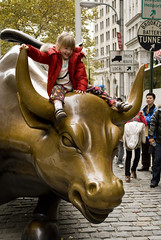After all, apocalyptic predictions of the world ending are said to point to the year 2012! Is Nouriel Roubini an economist or a prophet in the mold of Nostradamus or even St John the Apostle (who wrote the book of revelation) Did Nostradamus and St John, along with the ancient Mayans receive a direction from God that points to 2012 as "the year of destruction"? Did Dr. Roubini receive the same message two centuries later?
Is Jim Cramer one of the false prophets foretold by St John? Is his recent prophecy of a rising bull market helping to cause a wild party of unbridled optimism when the world, according to Prophet, Roubini, is about to go to hell in a hand basket? Hell, even Charlie Munger of Berkshire-Hathaway thinks that 2012 is the year of doom. (see- Charlie Munger). His partner, the venerable Warren Buffet remains an eternal optimist, buying a Chinese car company and an American Railroad in the past year. Others are warning of a future of Hyper Inflation.
I certainly don't have all the answers, but these guys believe they do. However with sentiment so split between the giddy bull soothsayers and the doom and gloom naysayers, how can we mere mortals find our way through the investment jungle that has become today's market. Well, in point of fact, it has always been a jungle and experience teaches that when people are in turmoil, especially investors, opportunities usually abound. The problem is, how do you find such opportunities, when your Retirefund won't allow you to invest in Berkshire-Hathaway.
In previous articles I have made the argument for gold. I have told you about the coming Lithium boom. I have mentioned hidden gems in Mobile Web stocks, and (besides Lithium) I have given you my ideas on green energy stocks and new clean technologies that are not quite on the radar of the big dogs just yet.
I have told you to invest in great companies like TD Bank and Encana, over the long term. I have warned you about the gluttons of Wall Street, and I have tried to steer you away from the leeches in the Managed mutual fund industry. I even advised you twice, last year and this year, to hold on to your Loonies!
More moderate voices can be heard through the din of disaster scenarios and scare mongering. One of those is Peter Bisson, a director of McKinsey and Co, of Stamford, Connecticut. In a recent interview with the Globe and Mail, titled, a great re-balancing of economic power, he makes some interesting points about the current markets. Some of his thoughts:
"The financial crisis is just a little earthquake in a long process of fundamental economic realignment. !"
"globalization is basically a good thing. It has lifted huge numbers of people out of poverty"
"For the first time in hundreds of years, there will be more growth i
"the work force in a lot of the West still fits a 20th century economy. In the U.S., there is only 3 per cent unemployment in the most highly educated groups, but 30 per cent unemployment in the bottom 10 per cent of education. We are drifting toward this chronically unemployed group because skill sets don't match."
"Canada is a big beneficiary. This huge [emerging markets] urbanization and this doubling of the world's middle class drives very significant real increases in resource demand of pretty much all types." (and Canada is a supplier of many of those resources)!
"Inequality between nations is evening out; inequality within nations is getting worse. That is politically volatile, and you can't escape that reality."
And finally:
"The risk in the system today is more on the individual. On average each year, 15 per cent of U.S. households can now expect their incomes to fall as much as 50 per cent. That's a third higher than in the 1970s."
I encourage you to read the entire interview at: GlobeandMail.com

![Reblog this post [with Zemanta]](http://img.zemanta.com/reblog_b.png?x-id=ad21e6b3-c601-42c9-b732-77fe7cceb61e)